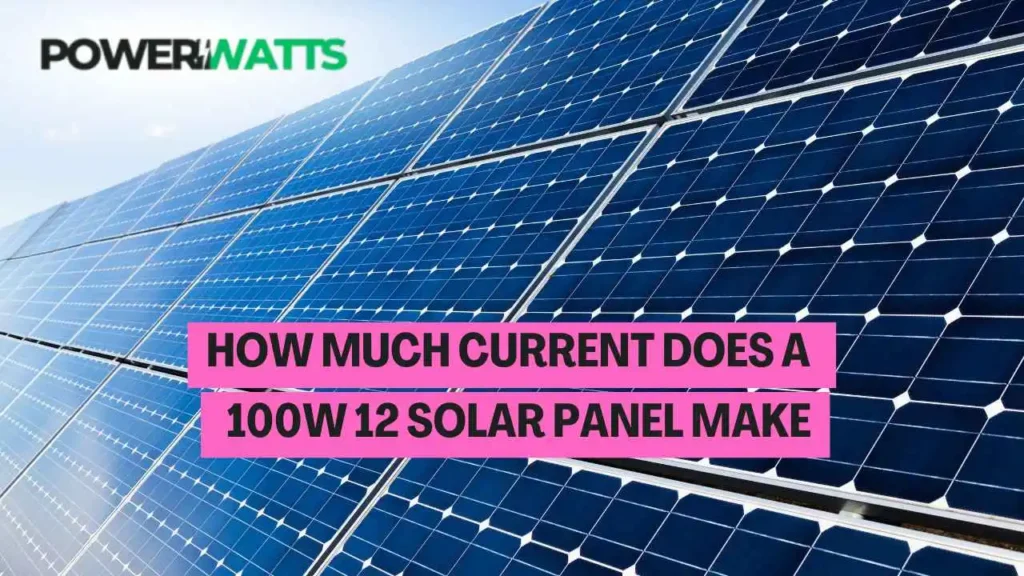A 100W 12V solar panel is popular among solar energy enthusiasts and practical users. These panels are utilized in RVs, boats, and remote power systems. Many prospective consumers wonder: how much current does a 100W solar panel make?
This blog will cover 100W solar panel parameters, current output calculations, and performance considerations. After reading this article, you will know everything about a 100W solar panel, enabling you to make educated solar energy selections.
Understanding Solar Panel Specifications
When judging a 100W solar panel, it’s important to look at a few important details:
- The highest power that the panel can make in perfect conditions is called Pmax. In this case, it is 100W.
- Most 12V solar panels have a voltage at maximum power (Vmp) of around 18V.
- Current at Full Power (Imp): The highest power is divided by the voltage to get this number. The Imp is about 5.5A for a 100W panel with a Vmp of 18V.
- When the panel is not attached to a load, the voltage is called open-circuit voltage (VOC). It is generally higher than voltage (Vmp).
- Temperature Coefficient: This shows how the efficiency of the panel changes as the temperature changes. When temps rise, output can go down.
Knowing these specs helps people figure out how well the panel works and whether it’s right for their needs.
How Much Current Does a 100W 12V Solar Panel Make?
You can use the following method to find out how much power a 100W solar screen puts out:
- Current A = Power W/ Voltage V
For an 18V 100W solar panel:
- Current= 100W/18V ≈5.5A
The factors used in this estimate are ideal, which doesn’t happen very often in real life. So, the real amount of power may be different.
Factors Affecting Solar Panel Output
A 100W solar panel’s current flow can be changed by a number of things, including:
- How the weather is: Covering the panel with clouds, rain, or snow can cut the amount of sunshine that reaches it, which lowers its output. For example, if it’s cloudy, the panel may only be able to produce 10 to 20 percent of its full power.
- Panel Tilt and Orientation: How much sunlight the panel gets depends on how it is placed. For the most light, panels should be turned toward the sun.
- Temperature: Solar panels may not work as well when it’s very hot outside. Most panels are designed to work at 25°C (77°F), and if the temperature goes below or above this, it can affect the output.
- How Clean the Panel Is: Dust, dirt, and other particles can block the sun and make the panel work less well. Cleaning on a regular basis can help keep things running at their best.
- Shade: Trees, buildings, or other things that block the sun from reaching the panel can greatly lower its power.
- Quality of the Panel: There may be differences in how well and how efficiently different brands and types work. Most of the time, high-quality panels work better when conditions aren’t ideal.
Performance of 100W Solar Panels
In real life, a 100W solar panel can make anywhere from 300 to 600 watt-hours of energy per day, based on the things we talked about above. For instance, a panel could make about 590 watt-hours of power a day in perfect circumstances, which is enough to charge devices several times. On the other hand, if it’s dark, the same screen might only make 50 watt-hours.
Applications of 100W Solar Panels
100W solar panels are best for RVs , flexible and can be used for many things, such as
- RVs and boats: Great for charging batteries, running lights, and small tools.
- Remote Power Systems: These are good for houses, sheds, and other places that aren’t connected to the power grid.
- Backup Power: This type of power can be used with battery systems to provide power in case of a disaster.
- Small Appliances: Things that use electricity, like fans, lights, and small tools.
Conclusion
An adaptable and efficient 100W 12V solar panel generates clean, renewable energy from the sun. These panels may generate 5.5 to 6 amps, or 300 to 600 watt-hours per day, under ideal circumstances.
To continue your solar adventure, Get a Quote for customized help. Our professionals can help you choose the ideal solar system for your house or company based on energy needs, price, and location.
FAQs
What maintenance is required for solar panels?
As part of regular upkeep, the panels need to be kept clean and free of dirt. The wires and connections also need to be checked for problems caused by shade. Cleaning the screens a few times a year can help them keep working at their best.
How does the age of a solar panel affect its performance?
Solar panels can lose some of their power over time because of normal wear and tear, being outside in the weather, and material breakdown. Most of the time, high-quality screens last longer and keep their performance better over time.
What is the best angle to install a 100W solar panel?
The best angle for construction will rely on where you live. For the best light all year, panels should usually be tilted at an angle equal to your latitude. Changes can also be made based on the season to get better results.
Can I increase the output of my solar panel?
Yes, you can get more power by putting the panel in the best position, keeping it clean, removing any shade, and maybe even adding a solar battery to store the energy. To get the most out of your system, it’s also important to do regular repair and tracking.


